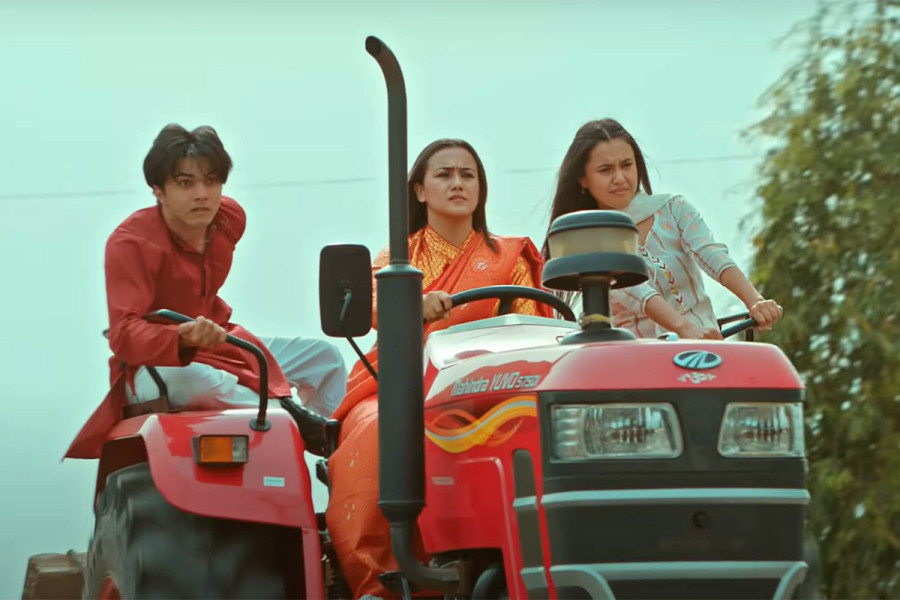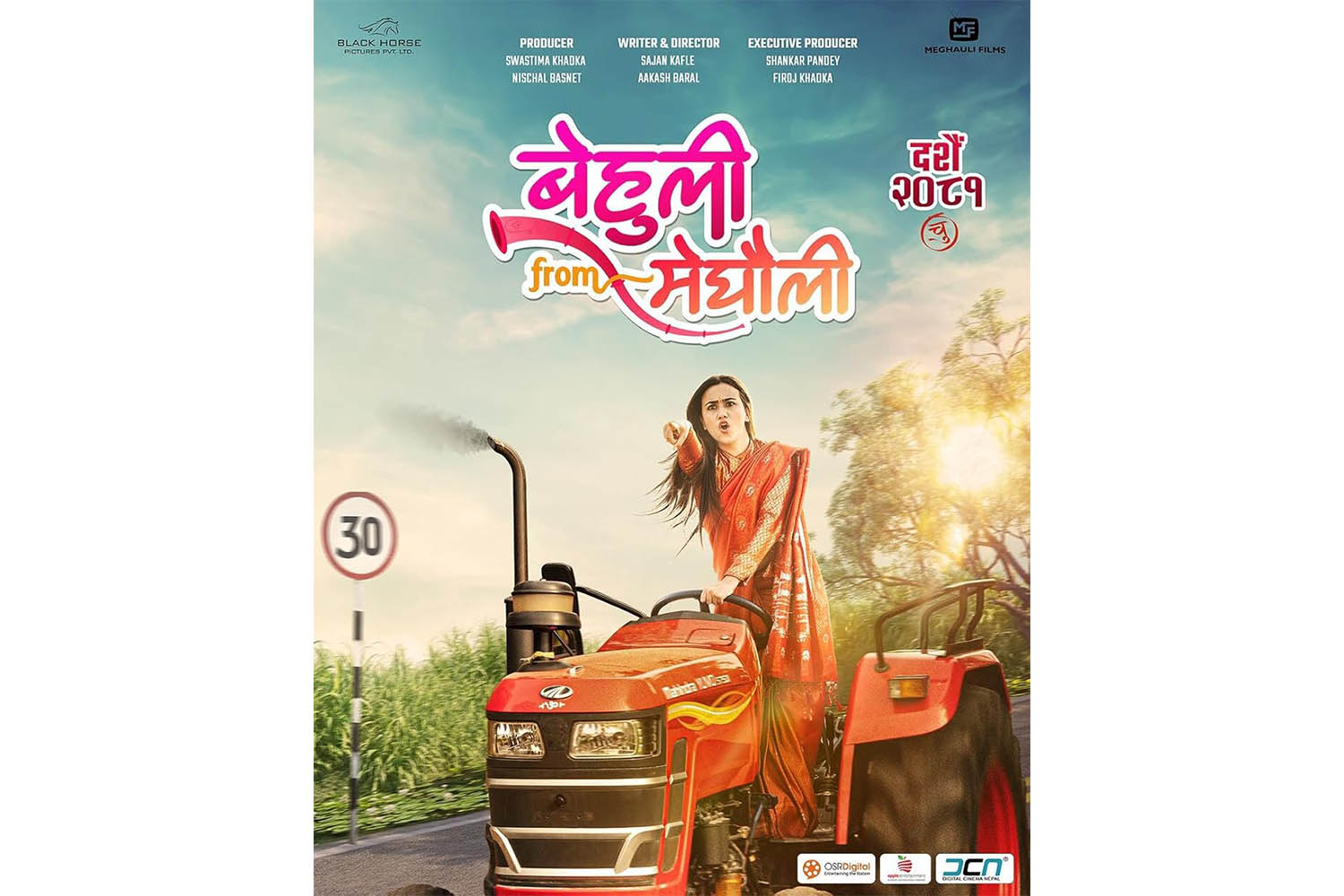Movies
A marriage of unrealistic expectations
Strong performances carry ‘Behuli from Meghauli’, but loose ends and clichéd plotlines prevent it from reaching its full potential.
Rishika Dhakal
Catchy songs and good cinematography are not the only ingredients for a good movie. However, the makers of ‘Behuli from Meghauli’ seem to have no clue.
A family drama, the plot of the movie unfolds in a patriarchal setting. The protagonist, Meena (Swastima Khadka), is a 30-year-old woman attending her neighbour Bindu’s wedding. There, she is pressured to marry by her family and neighbours. The story’s inciting incident begins when Bindu is abandoned by her husband on the wedding day. When the bride faints, it looks a little unrealistic. You will see bits and pieces of such unrealistic acts throughout the movie. This incident leads Meena, who has been waiting for her boyfriend of seven years, to worry about her marriage.
Her boyfriend Niraj (Nischal Basnet) shows up at their house only to break up with Meena. Basnet’s character lacks the gravitas he displayed in his previous films. With his fickle dialogue and weak characterisation, it is clear that the directors have neglected his portrayal in the movie.
A dramatic scene follows where Meena’s father falls to his knees in front of Niraj, saying that his daughter’s future is in grave danger if he doesn't marry her. This particular dialogue is repeated so much that it leads the audience to question the filmmakers’ intention: is it meant to indoctrinate the audience into accepting traditional gender roles, or is it an attempt to raise awareness about women’s rights and autonomy?
Meanwhile, Niraj does not explain the breakup, repeatedly stating that he doesn’t want to be with Meena. She goes through a period of heartache, spending her days like any other person nursing a broken heart. At this juncture, the film uses symbolism well, showing Meena riding her scooter whenever she is in denial about her emotional struggles.
In one of her rides, Meena gets into an accident and falls from her scooter. The damsel in distress is now saved by another charming prince, Siddhartha (Shishir Siwakoti), bringing a new dimension to the movie. Meena pays no heed to Siddhartha and is still living in the hopes of getting back to her ex. Meanwhile, Niraj has started dating a new girl, and Meena’s parents have started consulting a matchmaker who runs ‘Bihe Bhayo dot com’.
With pressure building from society, Meena is urged by her relatives to marry a drug addict. Similarly, Meena finds Nischal and his lover, Ishita (Rakshya Thapa), with the priest looking at their cheena (horoscope compatibility).
Under the pretext of portraying society as it is, the directors have resorted to depicting Meena as someone lacking self-esteem. The chasing and running after the ex-lover is exaggerated to the point that it reduces Meena’s character to a mere caricature of desperation rather than a nuanced representation of a woman’s struggle for agency.
Consequently, Meena goes to extreme lengths to sabotage Niraj and Ishita's relationship. She changes the couple’s horoscope compatibility, bribes the priest to declare them incompatible, and even visits Niraj’s parents to expose Ishita’s past of a broken engagement with another man. All her attempts to stop Niraj and Ishita from marrying each other fail when the couple decides to move forward with the marriage.
Meanwhile, under pressure from her family to marry the addict, Meena instead chooses to settle for Siddhartha, who is two years younger than her. Meena lies about her age, claiming to be 22, but her deception is eventually uncovered.
I do not understand the purpose of a female character, who happens to be Meena’s cousin, a lawyer who pops up suddenly at different intervals. She feels shoehorned into the story and contributes little to the plot. Do I smell tokenism?
Though the movie advocates asserting women’s rights and freedom, its dialogue suggests otherwise. For instance, when the cousin tells Meena that she could claim rights over her parents' property if she is forced to marry against her will, Meena retaliates by saying, “Keep your feminism to yourself.” This indicates that the filmmakers don’t understand feminism, or perhaps they subscribe to the notion of “believing in feminism, but only the ‘good’ kind”—where ‘good’ is defined within the confines of a patriarchal mindset.
Getting back to the plot, Meena wakes up to witness a full-fledged wedding preparation dedicated to her. When she tries to protest, her father locks her in a room and continues with the preparations.
With her sister’s help (Simran Khadka), Meena escapes the room and drives her tractor to Niraj and Ishita's wedding. In an unfortunate turn of events, Niraj’s intention to marry Ishita is revealed, leading to the cancellation of their wedding. It turns out that Ishita is a nurse in Australia, and Niraj wants to secure a green card for himself.
If the movie's plot had been more cohesive, I would have considered the scene where Meena destroys the Mandap of Niraj and Ishita to be iconic. Unfortunately, the movie has depicted Meena as dependent on male validation. Meena’s desperation to win back her ex and to stop him from marrying someone else shows that despite her strength, her emotional core is still shaped by a man’s choices rather than her own.
The film promotes the idea that women are enemies of each other, which becomes evident when Meena, desperate to win back her ex, says, “It feels like that girl has done something to cause trouble," expressing her frustration and blaming another woman for her failed relationship. If the movie prides itself on advocating for women's rights, then it would have been preferable to see Meena and Ishita overcoming their struggles by forming alliances earlier on rather than spending the majority of the film in this strained dynamic over a man. Apart from these discrepancies, the comic relief character Bijay Baral has done a commendable job.
Without the comic relief characters, the film would have lacked its spark. Another actor that deserves appreciation is Swastima Khadka, who delivered a stellar performance. Unlike many Nepali films that try to replicate Bollywood movies, this movie should be applauded for portraying issues rooted in its audience's experiences.

Behuli from Meghauli
Director: Aakash Baral
Cast: Swastima Khadka, Simran Khadka, Nischal Basnet, Bijay Baral
Duration: 2 hrs 9 minutes
Year: 2024
Language: Nepali




 15.47°C Kathmandu
15.47°C Kathmandu












